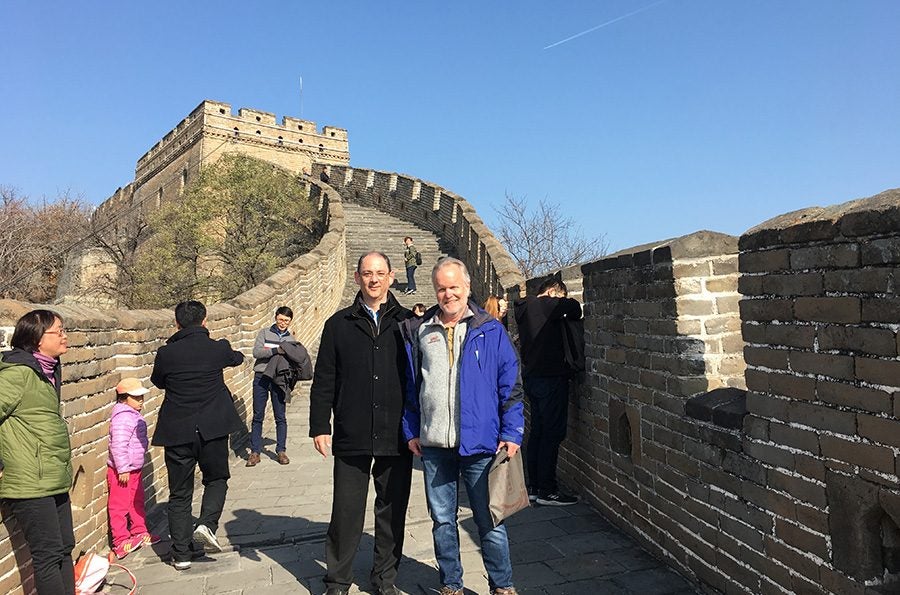Two Faculty Strengthen College of Dentistry’s Relationship with China

Introduction
The University of Illinois at Chicago College of Dentistry’s relationship with China has gotten even stronger thanks to a visit there by Dr. Brad Johnson, Endodontics ’91, MHPE ’05, Head and Director of Postdoctoral Endodontics, and Dr. Kent Knoernschild, Professor, Restorative Dentistry, and Director of the Advanced Specialty Program in Prosthodontics.
The two presented at the Peking Union Medical College and Hospital Multidisciplinary Forum for Dentistry in Beijing for about a week recently.
Dr. Lin Tao, Professor, Oral Biology, was the original connection who brought several visiting scholars from Peking Union to the UIC College of Dentistry in 2016. The Chinese school in return extended an invitation to the College to send some of its scholars to China, and Drs. Johnson and Knoernschild took them up on the offer. Peking Union paid all expenses. The official sponsor was Professor Jizhi Zhao, Head of Dentistry there.
Dr. Johnson presented on Regenerative Endodontics, and on Endodontic Microsurgery: Impact of New Materials and Technology on Outcomes, also performing an endodontic microsurgical procedure on a model.
Dr. Knoernschild presented on Optimizing Outcomes: Dental Implant Patient Diagnosis and Treatment Planning for Single and Multiple Units, and Diagnosis, Virtual Planning, Guided Surgery, and the Prosthodontic Reconstruction.
They received good advice on what to expect in China from College faculty who have been there—Dr. Tao; Dean Clark Stanford; Dr. Christine Wu, Professor, Pediatric Dentistry; and Dr. Qian Xie, Assistant Professor, Endodontics. “I emailed Dr. Xie twice while in Beijing for advice,” Dr. Johnson noted.
Peking Union is one of the most prestigious hospital/medical schools in China, “so the technology and facilities were similar in many ways to what you would find in this country,” Dr. Johnson said. “Their best teaching hospitals are well-equipped.”
“Dental implants are just beginning to gain popularity there as a care modality, so it’s important to do whatever is possible to retain teeth using endo,” Dr. Knoernschild explained. “In their 20-chair dental clinic, nearly half the chairs are reserved for endo. Patients make appointments, check in, and review their test results at terminals that look much like ATMs.”
He noted that the Peking Union hosts specifically asked Dr. Knoernschild to speak about implants “to grow their ability to provide that approach to care.”
“I feel that Dr. Knoernschild and I both made solid connections with our hosts and opened up the possibility of even more future scholarly exchanges between UIC and Peking Union,” Dr. Johnson said, noting that the Chinese school’s faculty now “have a better idea of what we do here. I was able to include some of the research done in our department in my presentation, which was primarily clinical.”
“They seem serious about growing an educational and academic exchange relationship between our two institutions,” Dr. Knoernschild noted. “They are thinking of longer programs for the future, and one of the coordinating doctors said she looked forward to see us in either America or China again.
“As speakers, we gave visibility to UIC as a leading and innovative academic, clinical, and research institution,” Dr. Knoernschild said.
Dr. Johnson was very complimentary of “the attention and generosity of our hosts,” he said. “They really took care of everything.”
Dr. Knoernschild agreed. “Dr. Johnson and I mutually said we were having lessons in hospitality—such respect, attention to detail, kindness, friendliness, and warmth.”
The duo also experienced Beijing and nearby areas.
“It’s interesting to see how they have preserved a lot that represents China’s ancient history while at the same time developing a densely populated, modern city of more than 20 million people with buildings, stores, and roads that look similar to those of a typical U.S. city,” Dr. Johnson said. “It was a little surprising that many signs were in Mandarin and English.”
“China is such an incredible mix of ultra-new with ancient,” Dr. Knoernschild said. “State-of-the-art technology superimposed on thousands of years of culture.”
Traffic in Beijing “was much worse than Chicago,” Dr. Johnson said.
“People, bicycles, scooters, cars all crowding the streets,” Dr. Knoernschild said. “Pedestrians do not have the right of way. Shoulders on the freeway were often just another lane, with many on the shoulder driving the speed limit. Wow!”
They visited the tourist sites—the Forbidden City (the old imperial palace), hutongs (older preserved neighborhoods), the Great Wall of China, temples and palaces, markets “where hard bargaining over price was expected and encouraged,” Dr. Johnson said, and restaurants.
“Saying the food was great was an understatement,” Dr. Knoernschild said. “Chinese food in Beijing is incredible.”
Dr. Wei Wong, who had visited the College in 2016, joined Drs. Johnson and Knoernschild on the Great Wall, walking more than two miles with them up and down steep hills and stairs.
The two thanked Professor Zhao, and Associate Professor Li Qian, and Drs. Wong, Wang, He, Ho, and Ge of Peking Union “for a wonderful and well-coordinated visit,” Dr. Knoernschild concluded.
Caption: Dr. Kent Knoernschild and Dr. Brad Johnson on the Great Wall of China.